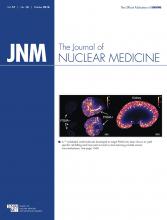TO THE EDITOR: Marincek et al. (1) recently presented a study aimed at evaluating the long-term outcome after treatment with 90Y-DOTATOC and 177Lu-DOTATOC in patients affected by unresectable progressive meningioma. In that study, 34 patients from Europe and North America were treated with 90Y-DOTATOC and 177Lu-DOTATOC until tumor progression or permanent toxicity occurred. The authors concluded that 90Y-DOTATOC and 177Lu-DOTATOC are promising tools for the treatment of progressive unresectable meningioma, especially in patients with high radiopharmaceutical accumulation in the tumor.
Recently, my group reported on peptide receptor radionuclide therapy in 8 patients who had been referred to the unit of nuclear medicine of our university hospital with a diagnosis of meningioma (6 patients) or meningiomatosis (2 patients) (2). On 111In-pentetreotide scintigraphy, all patients showed grade 2 or 3 tumoral uptake; moreover, the median tumor-to-nontumor ratio as evaluated by a standard region-of-interest method on the 24-h scan was 5.7, ranging from 2.9 to 9.1. All patients had been treated with 111In-pentetreotide at high therapeutic activities (2–4 cycles, median activity per cycle, 7 GBq; cumulative activity range, 4.8–29 GBq); one patient had been previously treated with 6 cycles of 90Y-DOTATOC (cumulative activity, 13.3 GBq; the patient had a mild impairment of renal function); in 2 patients, a cocktail of 111In-pentetreotide and β-emitting radiolabeled peptides (90Y-DOTATOC and 177Lu-DOTATATE) had been administered. Disease response was evaluated on the basis of the Southwest Oncology Group criteria: partial response was noted in 2 patients, stable disease in 5 patients, and disease progression in 1 patient. No acute toxicity or neurologic or renal function impairment occurred. Mild and transient hematologic toxicity was found in 4 patients. No significant correlations were noted between objective response and patient age, World Health Organization tumor grade, baseline Karnofsky performance score, baseline disease state, or cumulative dose.
The results of our study are similar to and support the results of Marincek et al. for peptide receptor radionuclide therapy in patients with progressive unresectable meningiomas, even after multimodal treatment, especially in patients with limited treatment options or recurrent lesions. Moreover, our study found that treatment with 111In-pentetreotide was well tolerated and effective in patients with meningiomas or meningiomatosis. We thus concluded that, considering the lack of significant toxicity, peptide receptor radionuclide therapy of meningiomas using 111In-pentetreotide can be proposed even today if the use of 177Lu- or 90Y-DOTA-peptides seems unsafe, namely in patients with renal impairment or toxicity. I further suggest the use of 111In-pentetreotide or 177Lu-DOTA-peptides (characterized by a shorter penetration range than 90Y-DOTA-peptides) in patients who have progressive unresectable meningiomas involving critical structures (vascular and neural ones) to avoid eventual complications from radiation-induced edema.
Footnotes
Published online Feb. 25, 2016.
- © 2016 by the Society of Nuclear Medicine and Molecular Imaging, Inc.







